| 1 |
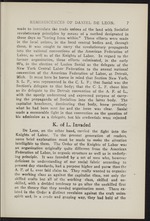 |
“...**boring from within.* These efforts were made
in the local unions, in the local central bodies and, through
these, it was sought to carry the revolutionary propaganda
into the national conventions of the American Federation o!
Labor, as well as of the Knights of Labor. In regard to the
former organization, these efforts culminated, in the early
90s, in the election of Lucien Sanial as the delegate of the
New York Central Labor Federation to the annual national
convention of the American Federation of Labor, at Detroit,
Mich. It must here be borne in mind that Section New York,
S. L. P., was represented in the C. L. F.; that Sanial was the
Sections delegate to that body; that the C. L. F. chose him
as its delegate to the Detroit convention of the A. F. of L.,
with the openly understood and expressed purpose of carry-
ing the propaganda of Socialism into the latter body. The
capitalist henchmen, dominating that body, knew precisely
what he had been sent for and the issue was clear. Sanial...”
|
|
| 2 |
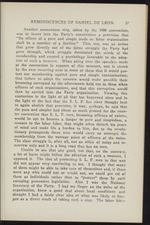 |
“...contention in the light of all that has happened since and in
the light of the fact that the S. L. P. has since thought best
to again abolish that provision, it may, perhaps, be said that
the pure and simpler had about as much ground for the coun-
ter contention that S. L. P. men, becoming officers of unions,
would be apt to become a danger to pure and simpledom, a
menace to the labor faker, that might often disturb his peace
of mind and make life a burden to him, due to the revolu-
tionary propaganda these men would carry on amongst the
membership from the vantage point of officers of the union.
The class struggle is, after all, not an affair of today and to-
morrow only and it is a long road that has no turn.
Unable to see that any good, but that, on the contrary,
a lot of harm might follow the adoption of such a measure, I
opposed it. The idea of protecting S. L. P. men in that way
did not appear very convincing to me. I thought that many
of them might be able to take care of themselves...”
|
|
| 3 |
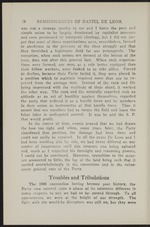 |
“...28 REMINISCENCES OF DANIEL DE LEON.
was not a strange species to me and I knew the pure and
simple union to be largel}- dominated by capitalist interests
and even permeated by bourgeois ideology, but I did not for-
get that most of these organizations were, nevertheless, formed
in obedience to the pressure of the class struggle and that
they furnished a legitimate field for our propaganda. The
exception, when such unions are formed at the behest of the
boss, does not alter this general fact. When such organiza-
tions were formed, our men, as a rule better equipped than
their fellow workers, w'ere looked to to take office. Forced
to decline, because their Party forbid it, they were placed in
a position which to maintain required more than can be ex-
pected from the average man. Instead of the rank and file
being impressed with the rectitude of their stand, it worked
the other way. The rank and file naturally regarded such an
attitude as an act of hostility against themselves, regarded
the...”
|
|
| 4 |
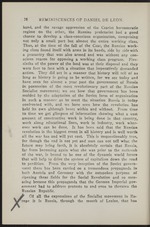 |
“...unquestionably true,
for though the end is not yet and man can not tell what the
future may bring forth, it is absolutely certain that Russia,
far from becoming again what she was prior to the outbreak
of the war, is bound to be one of the dynamic world forces
that will help to drive the system of capitalism down the road
to perdition. From the very inception of the Soviet govern-
ment there has been carried on a tremendous propaganda in
both Austria and Germany with the outspoken purpose of
ripening these fields for the Social Revolution and so men-
acing became this propaganda that the German Imperial gov-
ernment had to address protests to and even to threaten the
Russian Republic.
Of all the expressions of the Socialist movement in Eu-
rope it is Russia, through the mouth of Lenine, that ha*...”
|
|
| 5 |
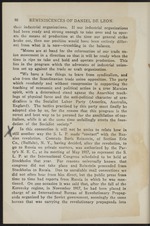 |
“...place and Reinstein proceeded from
Stockholm to Russia. Due to unreliable mail connections we
did not often hear from him direct, but the public press from
time to time had reports from Russia in which he was men-
tioned. On one occasion it was said that, after the fall of the
Kerensky regime, in November 1917, he had been placed in
charge of an International Bureau of Revolutionary Propag-
anda organized by the Soviet government, seemingly the same
bureau that was carrying the revolutionary propaganda into...”
|
|
| 6 |
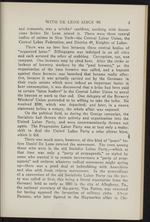 |
“...political field, as during the George campaign, the
Socialists had thrown their activity and organization into the
United Labor Party, and were unceremoniously thrown out
again. The Progressive Labor Party was at best only a make-
shift to deal the United Labor Party a solar plexus blow,
which it did.
There was much more, however, of this kind of peace be-
fore Daniel De Leon entered the movement. For even among
those who were in the old Socialist Labor Party,which at
that time was only a party of propaganda, so styled by
some who wanted it to remain forevermore a party of prop-
aganda and endorse whatever radical movement might spring
upthere was a good deal of hobnobbing with Anarchists
and also with freak reform movements. In the proceedings
of a convention of the old Socialistic Labor Party (as the pa-
ty was called at first, this being a literal translation from the
German) held as early as 1883 in the city of Allegheny, Pa.,
the national secretary of the .party, Van Patten, was censured
for...”
|
|
| 7 |
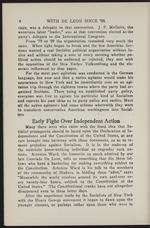 |
“...immediately sent on an agi-
tation trip through the eighteen towns where the party had or-
ganized Sections. There being no established party policy,
everyone was free to agitate his particular kind of Socialism
and express his own ideas as to party policy and tactics. Most
all the native agitators had some scheme wherewith they were
to transform conservative American workingmen into Social-
ists. '
Early Fight Over Independent Action
Many there were who came with the fixed idea that So-
cialist propaganda should be based upon the Declaration of In-
dependence and the Constitution of the United States, at any
rate brought into harmony with these documents, so as to re-
move prejudice against Socialism. It is in the make-up of
the nativistic know-nothing individual to engender such no-
tions. Artemus Ward, the humorist so much admired by our
late Comrade De Leon^ tells us something that fits these fel-
lows who have a hankering for making everything subject to
the Constitution. Artemus Ward in...”
|
|
| 8 |
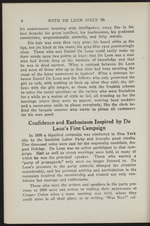 |
“...bargain counter who wants to please all customers
for his own good.
Confidence and Enthusiasm Inspired by De
Leons First Campaign
In 1890 a dignified campaign was conducted in New York
city by the Socialist Labor Party and brought good re-sults.
Five thousand votes were cast for the mayoralty candidate, Au-
gust Delebar. De Leon was an active participant in that cam-
paign. Hall as well as street meetings were held, at many of
which he was the principal speaker. Those who wanted a
party of propaganda only were no longer listened to. De
Leons presence in the party councils changed the situation
considerably, and his personal activity and participation in the
campaign inspired the membership and created not only con-
fidence but courage and enthusiasm.
Those who were the writers and speakers in the party pre-
vious to 1890 were not averse to making their appearance at
Cooper Union when a mass meeting was held, where^ they
could shine in all their glory, or to writing Was Nun? edi-...”
|
|
| 9 |
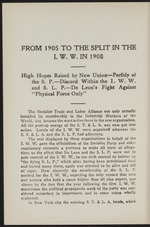 |
“...effect that De Leon and the S. L. P. were out to
gain control of the I. W. W., to use such control to bolster up
"the dying S. L. P., which after having been proclaimed dead
and buried many times, again was attested to be alive and full
of vigor. How sincerely the membership of the S. L. P.
worked for the I. W. W., expecting the only reward that men
and women who hold a cause higher than all else expect, was
shown by the fact that the year following the first I. W. W.
convention the political propaganda work of the party was con-
sidered secondary in importance, and in some states wholly
neglected.
In New York city the existing S. T. & L. A. locals, which...”
|
|
| 10 |
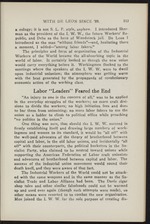 |
“...jail. De Leon I
introduced as the man without friendsand, hesitating there
a moment, I addedamong labor fakers.
The principles and form of organization of the Industrial
Workers of the World became the all-absorbing topic in the
world of labor. It certainly looked as though the new union
would carry everything before it. Workingmen flocked to the
meetings where the speakers of the I. W. W. were to dwell
upon industrial unionism; the atmosphere was getting warm
with the heat generated by the propaganda of revolutionary
economic action of the working class.
Labor Leaders Feared the End
An injury to one is the concern of all, was to be applied
in the everyday struggles of the workers; no more craft divi-
sions to divide the workers; no high initiation fees and dues
to bar them from unionizing; no more labor fakers to use the
union as a ladder to climlb to political office while preaching
no politics in the union.
One thing was sure, that should the I. W. W. succeed in
firmly establishing itself...”
|
|
| 11 |
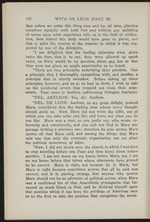 |
“...throw over the church in which I was born
to stop kneeling before one Pope and then kneel down before
another. I am not down on my knees before Marx, but I am
on my knees before that talent whose utterances have proved
to be correct. Marx is right, not because he is Marx, but
Marx is right because experience proves that all he said was
correct, and it is passing strange that anyone who quotes
Marx should not be an advocate of political action, when Marx
was a confirmed foe of that Anarchistic propaganda that has
caused so much blood to flow, and he declared himself upon
that position which it has been the privilege of American men
to be the first to take the position that recognizes the neces-...”
|
|
| 12 |
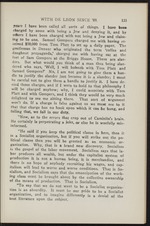 |
“...WITH DE LEON SINCE 89. 135
years I hare been called all sorts of things. I hare beea
charged by some with being a Jew and denying it, and by
oAers I have been charged with not being a Jew and claim-
ing to be one, Samuel Gompers charged me with having re-
ceived $50,000 from Tom Platt to set up a daily paper. The
gentleman in Denver who originated the term coffee and
doughnut propaganda, charged me with having sat at the
feet of Sam Gompers at the Briggs House. These are slan-
ders. But what would you think of a man thus being slan-
dered who says, 'Well, I will hobnob with Tom Platt and
Samuel Gompers? No, I am not going to give them a han-
dle to justify the slander just because it is a slander; I must
be careful not to give them a handle to justify it. I have de-
nied those charges, and if I were to hold to that philosophy I
will be charged anyhow; why, I could associate with Tom
Platt and with Gompers, and I think they would be very much
delighted to see me sitting there. That sort...”
|
|
| 13 |
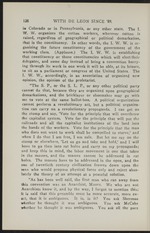 |
“...are organized upon geographical
demarkations, and the bricklayer or shoemaker may go with
me to vote at the same ballot-box. A political organization
cannot perform a revolutionary act, but a political organiza-
tion can carry on a revolutionary propaganda. I can get on
the stump and say, Vote for the principle that will overthrow
the capitalist system. Vote for the principle that will put the
railroads and all the capitalist institutions of the land into
the hands of the workers. Vote for the principle that the man
who does not want to work shall be compelled to starve, and
when I do that I am free, I am safe. But let me say on the
stump or elsewhere, Let us go and take and hold, and I will
have to go then into rat holes and carry on my propaganda;
and keep this in mind, the labor movement is one that takes
in the masses, and the masses cannot be addressed in rat
holes. The masses have to be addressed in the open, and the
sun of twentieth century civilization frowns down upon the
man who...”
|
|
| 14 |
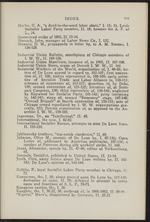 |
“...INDEX.
VII
Hoclin, G. A., a dyed-in-the-wool labor skate, 1. 15; St. Louis
Socialist Labor Party member, II. 18; booster for A. F. of
L., 34.
Homestead strike of 1892, II. 15-16.
Hossack, John, manager of Labor News Co., I. 132.
Howard, O. M., propaganda in letter by, to A. M. Simons, I.
126-128.
Industrial Union Bulletin, mouthpiece of Chicago members of
I. W. W., II. 149-150.
Industrial Union Manifesto, issuance of, in 1905, II. 107-108.
Industrial Union News, organ of Detroit I. W. W., II. 161.
Industrial Workers of the World, organization of, I. 49-50; let-
ters of De Leon quoted in regard to, 102-107; first conven-
tion of, II. 108; bodies represented in, 108-109; early activi-
ties of Socialist Trade and Labor Alliance in, 110-113;
schemes of opponents of, 113-117; desertion of, by Debs,
119; second convention of, 121-125; literature of, at Stutt-
gart Congress, 130; third convention of, 130-142; neglected
by Haywood for Socialist Party, 141-142; petty intriguing
in, 142-143;_ steps...”
|
|
| 15 |
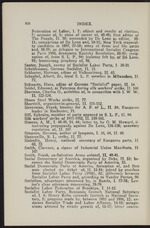 |
“... 14.
Seidel, Edmund, at Paterson during silk workers strike, II. 160.
Sherman, Charles O., activities of, in connection with I. W. W.,
II. 122-124.
Shoen Steel Works strike, II. 77.
Shurtleff, organizer-in-general, II. 111-112.
Sieverman, Frank, booster for A. F. of L> II. 34; Kangaroo
leader in Rochester, 71.
Siff, Ephraim, member of party opposed to S. L. P., II. 94.
Silk workers strike of 1911-1912, II. 159-161.
Simons, A. M., I. 48-49, 54, 64; letter to, by O. M. Howard, il-
lustrating propaganda against De Leon, 126-128; unsavory
reputation of, II. 107.
Simpson, Herman, author of lampoon, I. 36, 64, II. 68.
Slatersville, R. I., strike, II. 77.
Slobodin, Henry, national secretary of Kangaroo party, II.
68, 72.
Smith, Clarence, a signer of Industrial Union Manifesto, II.
107.
Smith, Frank, ex-Salvation Army colonel, II. 40-41.
Social Democracy of America, organized by Debs, II. S3; be-
comes the Social Democratic Party of America, 53.
Social Democratic Party of America, formation of...”
|
|
